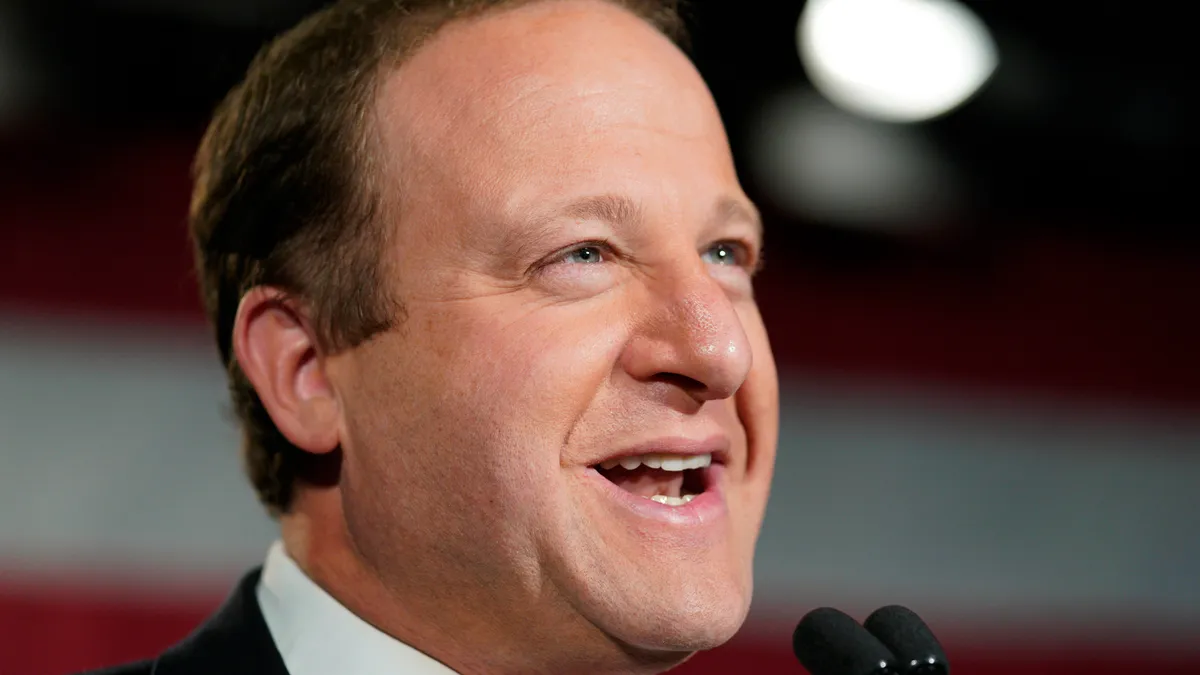Colorado passed a new law this week jettisoning its ban on credit card surcharges, leaving only two states with such prohibitions as a nationwide legal campaign against the ban gains ground.
The new law signed by Colorado's Democratic Gov. Jared Polis July 7 also allows a surcharge of two percent on the value of credit card transactions, or a surcharge equal to a merchant's cost to process the transaction. The change ushers in a new era for merchants in that state and leaves just Massachusetts and Connecticut with bans, according to a card processor that’s been fighting the bans in court. Colorado's new law is scheduled to take effect next July.
Merchants pay fees to banks, card network companies and their processors when their customers use credit cards. While those fees are typically in the low single digits, they add up and are a burden for merchants, especially smaller retailers. Now, Colorado merchants can recover that cost by adding the surcharge on credit card transactions.
It was a natural move in light of states across the country being sued over such bans and losing those legal battles, said Colorado Rep. Colin Larson, a Republican sponsor of the bill. He noted the legislation passed with significant bi-partisan majorities in the state legislature. “We were of the mind that ‘we’re going to get sued and not only are we going to get sued, we’re going to lose,’” Larson said. He noted that Kansas just lost such a legal battle.
“The whole philosophy behind this bill is this is a real cost to merchants,” Larson said in an interview. Under the new law, merchants can impose the surcharge, but they’re not required to. Some merchants will probably consider it a competitive advantage not to impose it, Larson said. But if they do impose it, Larson is pleased the new law will require them to be transparent about it by posting a notice about the surcharge.
The company leading the charge on lawsuits is Chicago-based payments processor CardX, which stands to benefit from stepping in to provide merchants with processing services that will meet parameters set by the card companies for handling those surcharges.
CardX CEO Jonathan Razi and Chief Operating Officer Michael Tomko “worked closely” with the Colorado house representatives and merchant groups,” Tomko said by email.
“The strong bipartisan support for the bill, the final version of which passed the House 61-4 and Senate 30-4, was informed by recognition that surcharging, when implemented properly, benefits not only businesses, but also consumers,” Tomko said by email. He argued that merchant price hikes on goods and services to cover the credit card interchange fees was essentially a tax on the poor, while more affluent cardholders that receive rewards, such as cash-back, benefited.
“A consistent pricing model nationwide is important for CardX as a service provider because many businesses that don’t yet accept cards, or only allow card payments in limited contexts, will start offering card payment options once surcharging is available, and we believe that regulatory clarity and consistency is a win for our clients, consumers, and the card issuers alike,” Tomko said by email.
Nonetheless, one of the major U.S. retail trade groups, the National Retail Federation, bashed the new law, saying surcharges, if they’re even used, don’t help consumers or retailers. Leon Buck, the federation’s vice president for government relations, banking and financial services, said allowing surcharges just keeps encouraging the card industry to increase fees, raising costs for consumers and lowering sales for retailers.
“Whether they are allowed to or not, most retailers do not surcharge for credit card use and most have no interest in doing so,” Buck said by email. “Surcharging would run counter to retailers’ goal of convincing the card industry to rein in the exorbitant fees charged to merchants to process credit card transactions.”











